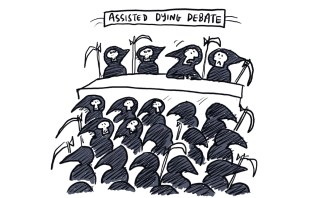In they pour, one after another, cheerily thudding on to the doormat: ‘Thank you for insuring with us again! Now, pay us more than you earn in a year!’ Yes, it’s insurance premium renewal time – and they’re shooting up once more.
Insurance premiums have swollen unstoppably, expanding upwards for all the world like a batch of evil mushrooms. In our household, home insurance alone now comes in at the same size as a monthly mortgage payment. Whack on to this car insurance (necessary), pet insurance (necessary?) and health insurance (in this day and age, yes), and you’d have to be earning the annual equivalent of Andorra’s GDP. What are we even doing? Shoving quantities of moolah (already diminished by the taxman) out to insurance companies, on the off-chance of an accident? You might as well put it all on a nag at Newmarket.
Yes, yes, I know why the practice of insurance began, back in the days of yore. It made sense then. You had your boat, you had your cargo of apes and ivories, and if it sank on the way back to the home port, you got your money anyway and didn’t have to farm your children out to the workhouse. And yes, it’s good for drivers to be insured in case of accidents (although we all leave bumps and scratches on the bodywork because we don’t want the premium to go up). And I know, too, that insurance companies really are taking a risk (most of the time), as demonstrated by the Lloyd’s Names disaster in the 1990s, where billions of pounds were forked out because of asbestos and pollution claims in the United States. Even so, there is a reason why that great sage Sir Terry Pratchett called it ‘insewerance’.
First, there’s the bonkers, arbitrary nature of the rises. ‘Oh it’s the market!’ sigh the brokers. ‘Everyone’s doing terrorism insurance now!’ Really? Do you think my suburban street will be invaded by Islamic State? Is it immensely more probable that my house will burn down today, rather than yesterday?
Then there’s the inscrutable, Byzantine torture of making a claim, should that accident actually happen. A relative was recently burgled. He’d sensibly kept all his receipts over the years (have you? Who has the time or space to do that?), and still his insurers quibbled and wouldn’t pass on the full amount. Another relative lost a valuable ring: the insurance company ummed, erred and stalled, and by the time they’d agreed to cough up for a replacement, they’d put up the premium by £200 per month, so in a couple of years she’ll have paid for it anyway.
How they love to dangle those juicy policies in front of us. Solemnly they intone that sometimes things go wrong. ‘You’ll be pleased for it when you need it,’ murmurthe sage insurance salesmen, passing you a rubbishy branded pen in exchange for a lifetime’s financial servitude. Talk about a Faustian pact! Whenever I’ve visited my bank for a chat about financial matters, they practically shove me in the direction of the life insurance desk. Do they want me to die? How long is it, I wonder, before someone offers to insure my insurance policy?
Why are we paying out all this cash? You might as well put it on a nag at Newmarket
Everything we buy now comes begging to be insured, as if we lived in a world so hazardous that we might be robbed, murdered or struck by lightning at any given moment. It’s crazy. At home we pay £4 a month to insure a single appliance – which one, I couldn’t possibly tell you. I just watch the money shooting away and think about the cappuccino I might have had.
It’s not as if the insurance companies are struggling. Allianz made a quarter of a billion pounds last year; Prudential’s profit was up 45 per cent; the Admiral Group, with its twee adverts (a female admiral! How modern!), raked in £443 million. Insurance is a trap, pure and simple, and we’re all stuck in it, with no means or hope of rescue. I’ve often wondered what happens to our money after it evaporates from our accounts. Is it piled up under the Prudential in Holborn, dragons jealously guarding the hoard? Do they build towers out of the gold bars? Are their lavatories carved from amethysts?

I could understand if the money was conserved in a savings account or trust, kept specifically for a purpose, like jars on the kitchen shelf, only instead of ‘motorbike’ they’re labelled ‘mass trespass’, ‘house fire’ or ‘apocalypse’. If I’d poured the equivalent amount into an Isa, not only would I have an emergency fund, but I’d also be able to do something useful with it, like, I don’t know, pay off the mortgage (which, incidentally, they want me to insure). Or even go on holiday! But oh no, off the cash goes, endlessly into the ether, oiling the wheels of the insurance racket. Oh sure, we get our ‘no-claims bonus’. Well, thanks for that, I’ll go out right now and buy a packet of nails.
It is not difficult, say some, to tell the difference between a banker and a vampire squid. Yet surely the insurers are worse, sucking the lifeblood from our incomes, and terrifying us with tales of disaster. This industry, more than all the others, needs attention and restructuring.
Instead of a no-claims bonus, how about reimbursing policy holders after a specified number of years, if the policy hasn’t been used: perhaps something like 20-30 per cent of the total paid in? There must be room for some financial whizz to invent a new vehicle that suits both parties. The insurers get their profits, we get our peace of mind – and, more importantly, nobody gets stung blue with the pain of it.
In the meantime, please don’t insure your fridge, even if the cheese looks like it’s becoming a biohazard. We don’t want them getting any ideas.







Comments